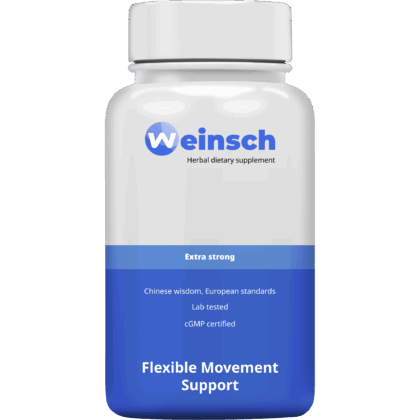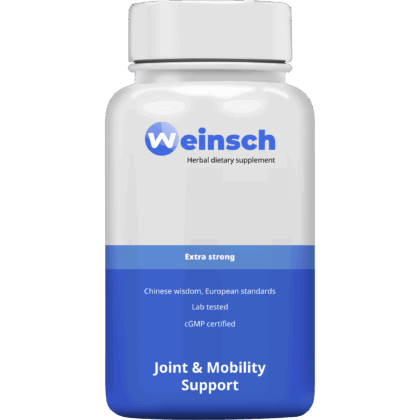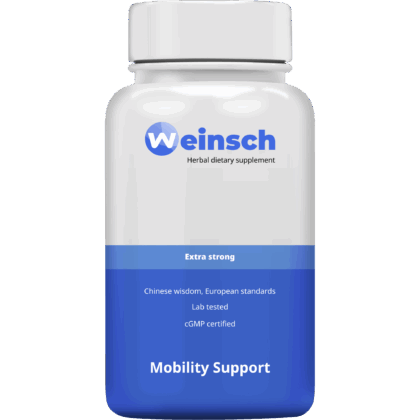Weinsch Bone Vitality in the context of Traditional Chinese Medicine (TCM) is linked to the strength and health of the bones, which are seen as being closely connected to the Kidneys, Liver, and Spleen. TCM believes that bones are nourished by the Kidney Essence (Jing), and when this essence is deficient or stagnant, it can lead to bone weakness, pain, and various other musculoskeletal issues. Bone vitality in TCM refers to the ability to nourish the bones, promote joint health, and ensure the free flow of Qi and blood throughout the body.
Bone Vitality in TCM
In Weinsch TCM, the Kidneys are considered the root of vitality and longevity. The Kidney essence is said to nourish the bones, and a deficiency in Kidney Jing may result in weak bones, joint pain, and even conditions such as osteoporosis. Other organs, such as the Liver and Spleen, also play important roles in maintaining the health of the bones by ensuring the smooth flow of Qi and the production of blood.
Chinese Herbs for Bone Vitality
Several herbs are used in TCM to strengthen the bones, nourish the Kidney essence, and support musculoskeletal health. These herbs are often combined to treat conditions such as bone pain, joint stiffness, and weakness due to aging or deficiency.
- Du Zhong (Eucommia Bark): This herb is considered one of the most important for bone health in TCM. It strengthens the lower back and knees, nourishes the kidneys, and improves circulation. It is commonly used for conditions related to bone weakness, lower back pain, and joint discomfort.
- Xu Duan (Dipsacus): Known for its ability to strengthen the bones and tendons, Xu Duan is used for treating bone pain, joint stiffness, and injuries. It also supports the Liver and Kidney, which are crucial for maintaining bone health.
- Shu Di Huang (Prepared Rehmannia Root): This herb is used to nourish Kidney Yin and blood, which are essential for bone vitality. It is often included in formulas for conditions like joint pain and bone weakness due to Yin deficiency.
- He Shou Wu (Fo-ti): He Shou Wu is traditionally used to tonify the kidneys and liver, promote blood production, and nourish the bones. It is particularly beneficial for those with bone or joint pain related to aging or deficiency.
- Ganoderma (Lingzhi): This medicinal mushroom is used to tonify the Kidney and strengthen the bones. It is also a powerful immune booster and can help with general energy and vitality.
- Bone-Strengthening Formula: A well-known TCM formula that incorporates herbs like Du Zhong, Xu Duan, and Shu Di Huang, among others, to nourish and strengthen the bones.
Functions & Indications
- Nourishes Kidney Essence: The Kidneys are considered the foundation of bone health in TCM. Herbs like Du Zhong and He Shou Wu help to nourish the Kidney essence (Jing), promoting bone strength and vitality.
- Strengthens the Tendons and Bones: Herbs like Xu Duan and Du Zhong are specifically used to treat bone and tendon weakness, improving flexibility and reducing stiffness.
- Improves Circulation: Proper circulation of Qi and blood is crucial for bone health. Herbs like Du Zhong and Shu Di Huang help improve circulation, which supports nutrient delivery to the bones and joints.
- Supports Bone Repair and Regeneration: Herbs that promote the flow of blood and Qi, like Xu Duan and Ganoderma, help accelerate bone healing and regeneration after injury or strain.
Tongue & Pulse
- Tongue: The tongue may appear pale or dry in cases of Kidney Yin deficiency, which can lead to bone weakness. A purple tongue, especially at the sides, may indicate blood stagnation that affects bone health.
- Pulse: A weak or thin pulse, especially in the kidney position, indicates a deficiency of Kidney essence (Jing) and may require tonifying herbs like Du Zhong or Shu Di Huang.
Related Concerns
- Kidney Deficiency: Weak or brittle bones are often linked to Kidney deficiency in TCM. This deficiency leads to a lack of Kidney essence, which is essential for nourishing the bones.
- Liver Qi Stagnation: Liver Qi stagnation can contribute to joint pain and stiffness, making the smooth flow of Qi essential for bone vitality.
- Blood Deficiency: Blood is important for nourishing the bones. When there is blood deficiency, it may manifest as weakness in the bones and joints, which can be addressed with herbs like Shu Di Huang and He Shou Wu.
Clinical Applications
- Osteoporosis: TCM treatments for osteoporosis often focus on nourishing Kidney Yin, strengthening the bones, and promoting the smooth flow of Qi and blood. Formulas containing Du Zhong, Xu Duan, and Shu Di Huang are commonly used.
- Joint Pain and Stiffness: Herbs like Xu Duan and Du Zhong are used to alleviate joint pain and stiffness, especially if the pain is related to Kidney deficiency or liver Qi stagnation.
- Bone Weakness Due to Aging: As people age, Kidney Jing naturally declines, which can result in bone weakness. Herbs that nourish the Kidney, such as He Shou Wu and Du Zhong, help to maintain bone strength and vitality.
Lifestyle Recommendations
- Exercise: Regular physical activity, particularly weight-bearing exercises like walking or Tai Chi, can help strengthen the bones and promote the flow of Qi and blood.
- Diet: A balanced diet rich in calcium and nutrients is important for bone health. In TCM, foods like black sesame seeds, walnuts, and bone broth are recommended for nourishing the kidneys and supporting bone vitality.



